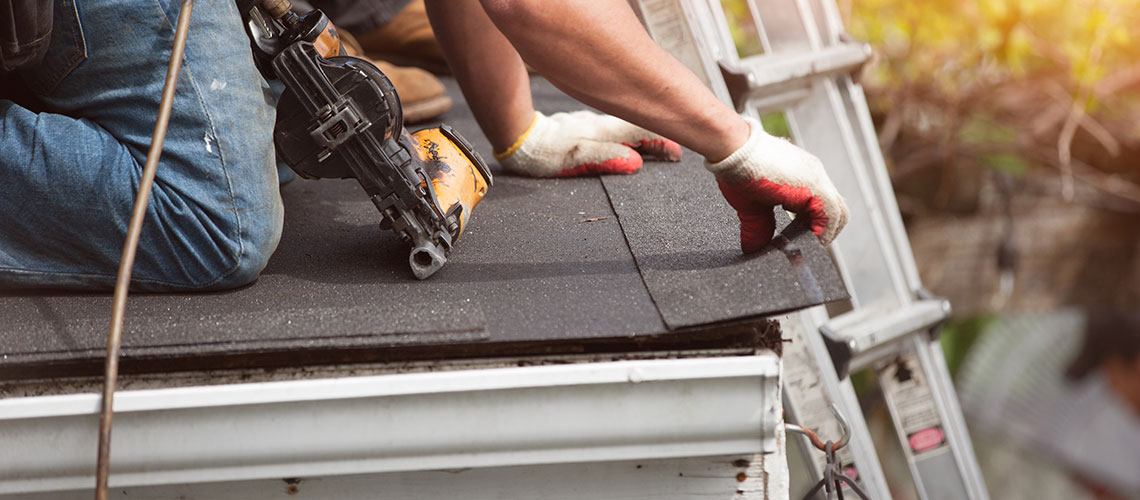
There’s nothing better than owning a home, especially when it starts to accrue value and your investment begins to pay off. It’s a fact, however, that owning a home can, at times, be a serious drain on your resources. This is especially true when you need to make important repairs.
Some home repairs are expensive but expected while others can catch you off guard and come with significant unplanned costs. Here are five key areas of your home you should stay on top of so you can catch and fix problems early. Then, if major improvements are needed, you can figure out ahead of time how to pay for them, such as with a cash-out refinance or home equity loan, to avoid the stress of sudden, unexpected repair bills.
1. Roof repair
As you may already know, roof maintenance is an important part of homeownership, from keeping gutters clean to moss removal and regular inspection for cracked or missing shingles. What many homeowners may not realize is how costly a roof replacement can be. This is because most roofs are built to last for decades, rendering them “out of sight, out of mind” most of the time. However, when a roof fails, it can fail catastrophically, and the longer you wait to have it fixed, the more expensive the damage.
Water can be very harmful to property once it gets inside and, in extreme cases, can even render a home uninhabitable. If you live in a rainy area, such as Oregon or Washington, your risk will be considerably higher, making it even more critical to keep your roof in good repair.
Water isn’t the only potential problem if your roof is compromised. Air getting in through old or worn-out insulation can drive up your energy bills and leave your home feeling cold in the wintertime or hot in the summer. A new roof might be costly, but sometimes it’s necessary.
2. The water heater
Turning on the shower only to discover you don’t have hot water can ruin your entire day. It’s worse, however, when the problem is that your water heater is leaking or starting to fail. Once the water heater begins to malfunction, it can eventually lead to floods, which can wreak havoc on everything around it.
This is why it’s important not to ignore warning signs like if the water heater doesn’t seem to produce enough hot water or takes too long to reheat. Far more than an inconvenience, these can be signs of a much greater problem. This is doubly true if your water heater starts making unusual sounds or oozing rusty water. While the cost might seem like a valid reason to put off making repairs or even a replacement, doing so could lead to further damage and much higher costs down the road.
3. Plumbing issues
Plumbing is an essential system in your home that you likely don’t give much thought to because it normally just works as expected. Some plumbing problems, like dripping faucets and running toilets, can be fairly simple to repair on your own. Less obvious issues, such as leaking pipes in crawl spaces, walls or cabinets, not only increase your water bill but can also quickly result in damage to your home and cost a bundle to repair.
Sewer lines and septic systems are other potential sources of complications, and you definitely don’t want to deal with that mess! Adhering to good plumbing protocols, like minimizing what goes down the drain, protecting pipes when it’s cold and fixing minor problems right away, can help prevent a plumbing emergency. But if things go awry, don’t wait. Call in a professional to fix the problem before it becomes more serious or causes additional expensive damage to your home.
4. Mold
Mold growth in the home is a serious problem because it doesn’t just damage the home itself. It can pose a health risk to your family as well. It’s also difficult to prevent entirely since mold spores are present nearly everywhere and require only damp conditions to grow and thrive. As they do, they can deteriorate the entire structure of the home, eating away at wood, drywall and other materials. As more and more mold spores are released into the air, conditions such as asthma and allergies can be significantly exacerbated.
Noticing the signs of mold can be tricky if you don’t regularly access areas where it’s likely to grow. But even if you don’t, mold will often provide hints of its presence. You may notice you’re coughing when you are not otherwise sick. Allergic reactions and other respiratory issues are often clear indicators of mold growth. If you discover the area where the mold is growing, it will appear as small black spots that will eventually grow larger. Most likely, this will begin in a damp area, such as underneath a leak in the roof or in the wall where a pipe has leaked. Moisture can also seep into the walls of rooms that regularly experience a lot of moisture, such as bathrooms.
If you suspect or notice signs of mold growth in your home, your best bet is to contact a mold specialist. Do this as quickly as possible so that the problem does not spread.
5. Sinking foundation
Your home is built on top of some type of foundation, and not all foundations are equally stable. Indeed, in rainy parts of the country, such as Washington and Oregon, the problem of sinking foundations can be a real concern. This is because the home may have been built when the soil that serves as the foundation was swollen with rainwater. As that soil dries, it can shrink. In turn, this can cause the house to settle in an uneven manner and can even cause the floors to warp and buckle.
As you may expect, a foundation can be quite costly to repair. Proper drainage and effective landscaping go a long way toward avoiding this issue. Making sure the foundation of any home that you buy is rich with clay also helps, as it is less likely to change over time. If you do need to make repairs, however, make sure they’re completed as soon as possible.
What to do when you need costly repairs
With any of the issues we’ve mentioned above, prevention is absolutely your best bet. Even if you stay on top of maintenance, the unexpected can occur, and you need to be prepared. Fortunately, you have options if you find yourself with a sizable, unexpected expense. If you belong to a good credit union like Solarity, you may be able to tap into the equity in your home with a cash-out refinance of your mortgage or a home equity loan. Either might be a good option to help you to come up with the money for an emergency repair to prevent the damage from spreading and costing you even more in the future.
Get in touch with us if you’d like to learn more about using the equity in your home to pay for a large expense like repairs or even a remodel. We’re happy to help!
What's your Solarity story?
We're on a mission to tell the stories of our members and how they are living their best lives. Do you have a Solarity story to share?
